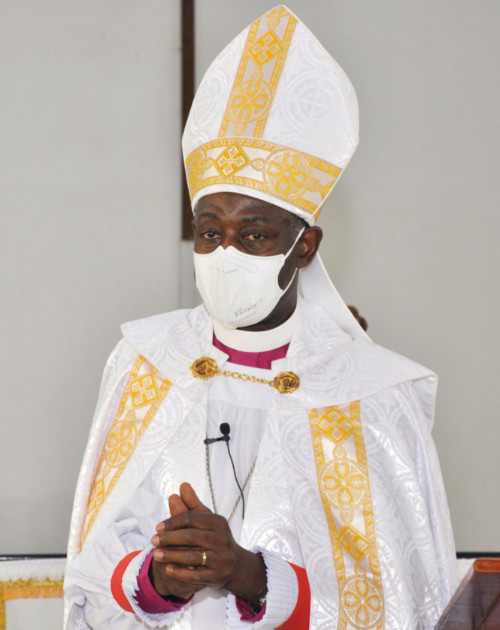The Archbishop of the Anglican Church of Uganda, Stephen Kaziimba Mugalu, has stopped Christians from taking bodies into churches during funeral prayers, citing the danger the act poses in spreading COVID-19.
Kaziimba has instead advised Christians to take portraits of the deceased for funeral prayers. He has also cautioned Ugandans against complacency, saying the pandemic is real and infections have sharply increased in the last couple of months. Many Ugandans continue to ignore Ministry of Health guidelines on the prevention of the spread of the virus. It is not uncommon to find people walking in a crowd without facemasks.

Archbishop of the Anglican Church of Uganda, Stephen Kaziimba Mugalu. PICTURE: Supplied.
In his Christmas message at the All Saints Cathedral in Kampala, Kaziimba also offered his consolations to those families whose loved ones have succumbed to COVID-19.
The Archbishop’s decision to ban the taking of bodies to church during funeral prayers has been welcomed by religious leaders from other denominations.
Monsignor Charles Kasibante, Roman Catholic Vicar General of Kampala Diocese, described the decision as “a right step in the right direction”. But he told Sight that the Catholic Church in Uganda only forbids entry into churches of bodies of people who have succumbed to COVID-19. He noted that despite the challenges that COVID-19 poses, funeral prayers are still critical for both the dead and living, arguing that they are a sign of respect to human life.
“The prayers show that in both joy and grief, we are with the Lord and that there is life after resurrection. That’s what gives us hope being around the dead person’s body,” he said.
Ivan Naijuka, a spokesperson for All Saints Church, told Sight that even before the Archbishop made his pronouncement, church officials were treading cautiously on allowing bodies into the church during prayers.
“Whenever relatives of the deceased came to book for funeral prayers, the first question we would ask was the cause of the death and if it was COVID-19, we wouldn’t allow the bodies inside,” he said.
But one of the biggest challenges that churches in Uganda face is determining the cause of death of people since death certificates are not commonly issued by hospitals.
Testing people for COVID-19 is also still at a low rate in Uganda because of the inadequate test kits and the high test fees. A COVID-19 test in Uganda goes for $US50, an amount that not many people can afford, and its even higher in private health facilities. The government only meets the cost of testing people who have been referred by hospitals.
Experts have argued that the inadequate test kits and high test fees mean the country’s COVID-19 statistics are not a true reflection of the situation on ground.
Before Uganda registered the first case of COVID-19 in March last year, families that lost their loved ones would take them to church for prayers. However, when the government imposed a countrywide lockdown on places of worship in March, the practice was halted. It only resurrected in October last year, when the lockdown on prayers in church was lifted.
Uganda has lost many key figures to COVID-19, including two members of parliament, a Deputy Prime Minister and some members of the clergy. According to the Ministry of Health, the country had registered more than 36,000 COVID-19 cases, with 274 fatalities, by 5th January.





